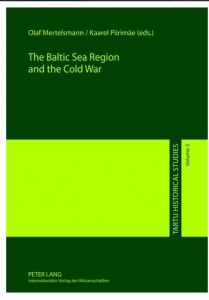 Mertelsmann, Olaf / Piirimäe, Kaarel (eds.)
Mertelsmann, Olaf / Piirimäe, Kaarel (eds.)
The Baltic Sea Region and the Cold War
This volume focuses on the Baltic Sea region during the Cold War. Recent research conducted in several countries has sought to revise a number of long-established assumptions about the Cold-War conflict, as they do not seem to fit into the context of the Baltic world. The bipolar perspective on the Cold War is more and more being replaced by the idea of multiple players being active on different levels. Thus it is now recognised that the so called Iron Curtain was not insurmountable and a variety of contacts in such fields as economics, culture, media or tourism could take place. In addition, neutral countries also participated vividly in Cold War interaction. Thus, not only high politics, security or military issues were at stake.
Contents: Kari Alenius: A Baltic Prelude to the Cold War: The United States and the Soviet Annexation of the Baltic States, 1939-1941 – Eero Medijainen: On the Razor’s Edge: The US Foreign Policy and the Baltic Issue in 1940-45 – Kaarel Piirimäe: ‘A Really Dead Issue’: the Baltic Question in the European ‘Non-Settlement’ at the Start of the Cold War – Pauli Heikkilä: Baltic Council of the European Movement (1948-1950): Regional Exception in Early European Unification – Lars Fredrik Stöcker: Bridging the Baltic Sea in the Cold War Era: The Political Struggle of Estonian Émigrés in Sweden as a Case Study – Vahur Made: Finland and the Baltic Question during the Cold War: a Non-Declaration Policy – Olaf Mertelsmann: The Social Costs of the Early Cold War: an Example from a Soviet Republic – Vahur Made: To be Anti-Communist or Anti-Soviet? The People’s Republic of China as a Dilemma for the Estonian Exiled Diplomats during the Cold War Period – Kim Frederichsen: Soviet Cultural Diplomacy in Denmark during the Cold War: The Case of the Society for Cooperation between Denmark and the Soviet Union – Virpi Kaisto: An Actor’s Perspective to the Cold War Finnish-Soviet Trade – Sigurd Hess: Intelligence Clash in the Baltic Sea during the Cold War – Pierre-Frédéric Weber: The Szczecin Lagoon in the Cold War: Germans, Poles, Czechoslovakians and the Soviets – Martins Kaprans: Normalising the Cold War habitus: How Latvian Autobiographers Cope with their Soviet-time Experience – James G. Connell, Jr.: Culture of the Cold War as Reflected in the American Reconnaissance Flights Lost over or near the Soviet Union Following the End of World War II.
Olaf Mertelsmann is Associate Professor in Contemporary History at the University of Tartu (Estonia).
Kaarel Piirimäe is a Marie Curie research fellow at the University of Tartu and a professor of strategy at the Estonian National Defence College.













